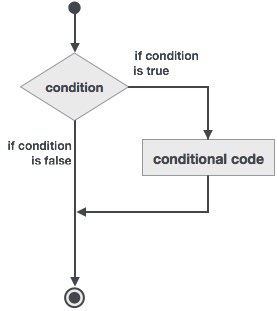if ... then 语句由一个逻辑表达式后跟一个或多个语句和终止 end if 语句。
语法
if… then 语句的基本语法:
if (logical expression) then statement end if
但是可以给一个名称,if 块,那么语法命名 if 语句如下:
[name:] if (logical expression) then ! various statements . . . end if [name]
如果逻辑表达式的计算结果为true,那么块代码内的 if ... then 语句会被执行。如果在结束后的逻辑表达式计算为false,那么第一个代码块之后的 if 语句会被执行。
流程图:

示例 1
program ifProg
implicit none
! local variable declaration
integer :: a = 10
! check the logical condition using if statement
if (a < 20 ) then
!if condition is true then print the following
print*, "a is less than 20"
end if
print*, "value of a is ", a
end program ifProg
当上述代码被编译和执行时,它产生了以下结果:
a is less than 20 value of a is 10
示例 2
这个例子说明了命名的 if 块:
program markGradeA implicit none real :: marks ! assign marks marks = 90.4 ! use an if statement to give grade gr: if (marks > 90.0) then print *, " Grade A" end if gr end program markGradeA
当上述代码被编译和执行时,它产生了以下结果:
Grade A
我要分享文章
最近发布 »
- windows IIS6服务器全站301永久重定向设置方法
- thinkPHP实现签到功能的方法
- 详解java代码中init method和destroy method的三种使用方式
- Python获取文件所在目录和文件名的方法
- linux sudo命令详解
- 用于判断用户注册时,密码强度的JS代码
- Django-Rest-Framework 权限管理源码浅析(小结)
- 服务器 安全检查要点[星外提供]
- python 导入数据及作图的实现
- JS正则替换去空格的方法
- 微信小程序promsie.all和promise顺序执行
- Android实现渐变色的圆弧虚线效果
- Python中文编码那些事
- JS跨域请求外部服务器的资源
- asp的程序能实现伪静态化的方法
- 基于Vue.js与WordPress Rest API构建单页应用详解
- 修改MaxFieldLength与MaxRequestBytes彻底解决Request Too Long的问题
- sql字符串函数大全和使用方法示例


